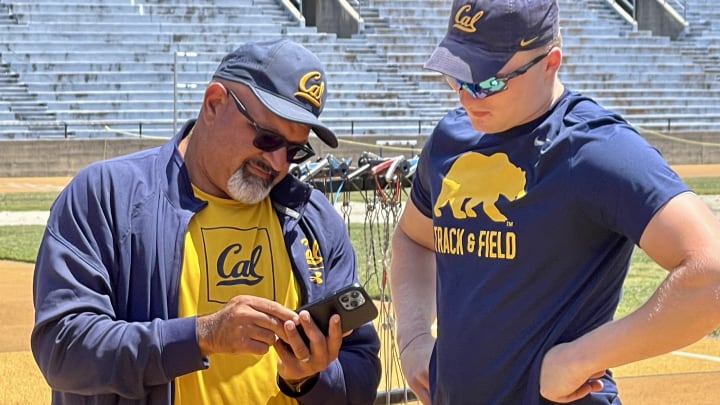At 21, Cal's Mykolas Alekna is Ahead of His Time as Gold-Medal Threat

There are plenty of things Lithuanian discus specialist Mykolas Alekna enjoys about being a student at Cal. He has learned to fend for himself 5,700 miles from home, cultivated friendships, benefitted from good coaching and worked to within a year of a UC degree.
Perhaps more than anything, Alekna treasures his anonymity on the Berkeley campus, even as he prepared to compete in the Paris Olympics.
“That’s why I like being here in the U.S. No one recognizes me. No one cares,” he said. “I really like it.”
Back home in Vilnius, Alekna, 21, is a budding celebrity.
Last summer, after finishing on the medal stand at the World Championships for the second year in a row, Alekna returned home and found little peace.
“It was a lot of attention,” he said. “I’m not really a fan of it.”
Cal throws coach Mo Saatara, who has tutored elite athletes from around the world, said it’s hard for Americans to relate to how a discus thrower is regarded in Alekna’s homeland.
“The way we look at NBA basketball players, Lithuania looks at discus throwers like that. It’s a big deal,” Saatara said. “For a small country, the number of discus throwers they have produced is crazy.”
Consider this: Lithuania has produced just three Olympic gold-medal winners ever in track and field, and all three were discus throwers.
“The other really big sport in Lithuania is basketball,” Alekna said. “But discus throwers are the ones with the medals at the Olympics. Everyone’s really into it.”
The first of the country’s three gold medalists was Romas Ubartas, who won at Barcelona in 1992. Virgilijus Alekna took home the other two golds — in 2000 in Sydney and ’04 in Athens.
Yep, Mykolas’ dad.
Virgilijus Alekna, who also won two World Championship titles, has parlayed his athletic success into a seat in the Lithuanian parliament. He ranked second on the all-time world list in the event until April 14, when Mykolas trekked to Ramona, Okla., and took down Jurgen Schult’s 39-year-old world record with a throw of 243 feet, 11 inches (74.35 meters).
Alekna understands that eclipsing a record set 16 years before he was born won’t help him in Paris, where qualifying in the discus is set for August 5 with the final two days later.
If anything, it will create more pressure in a competition where his primary rivals are older and more experienced.
“The feeling will come as the Olympics are closer. There’s going to be some pressure, but I like it,” Alekna said before leaving Berkeley for Europe. “I can’t wait to compete.”
In an interview at Cal’s Edwards Stadium a month after set the world record, Alekna said, “I’ve already forgot it. My aim goal is the Olympics. The world record wasn’t even my goal this year — it just happened.”
Pressed on whether the record alters the dynamic at Paris, Alekna acknowledged it probably does. “But I don’t really think about it. I just do what I love,” he said. “I enjoy the sport, so it doesn’t really matter to me.”
Funny thing is, he didn’t always love the discus. Mykolas was not yet two years old when his dad won his second Olympic title. Even later, when father and son spent time together, it was not in the discus ring.
“It didn’t look that entertaining compared to basketball or soccer or some other sports,” said Alekna, who played both of those sports as a youngster.
His father never pushed Mykolas toward the discus, but two years after older brother Martynas took it up, Mykolas gave it a try as a 16-year-old.
“It took some time to fall in love with discus,” he said. “I watched my Dad compete, but I never saw myself doing that when I was younger. The first two years were tough. Over time, I just found a connection with discus and now I love the sport.”
Alekna’s rise in the sport has been meteoric. The discus is not a young man’s event — his dad was 28 when he won his first Olympic gold and he was 40 at the 2012 London Games when he missed by one spot earning a fourth Olympic medal.
Among his leading challengers in Paris, only Slovenia’s Kristjan Ceh, the 25-year-old world champion from 2022, is younger than 28. Sweden’s Daniel Stahl, the reigning Olympic champ, is 31. Samoa’s Alex Rose, who joins Alekna and Ceh as the only men with 70-meter throws this season, is 32, the same age as Austria’s Lukas Weisshaidinger, who won silver three years ago in Tokyo.
Before arriving at Cal in the fall of 2021, Alekna’s best throw was 208-5. In less than three years, he has added more than 35 feet to that.
As Saatara suggests, “he’s way ahead” of where anyone could have imagined. Even Mykolas himself.
“Yeah, I’m really surprised, honestly. Every year I improve by a few meters,” Alekna said. “If you asked me a few years ago, I would never believe I would throw 74 meters at the age of 21.”
Saatara’s approach was not to add layers of muscle to Alekna’s 6-foot-5 frame, although he has naturally put on about 25 pounds. Instead, his coach recognized that Alekna’s greatest assets are speed and explosiveness.
Saatara trusts his athletes, Alekna said, creating a partnership. “He works at every athlete differently, tries to work on their strengths. My strength is not weight room, it’s speed and explosiveness and technique.”
Virgilijus Alekna, at 6-8, 287 pounds, was a different type of thrower from a different era. Likewise, Stahl is huge — 6-7, 342 pounds. Ceh stands 6-9.
Without referring to anyone specifically, Saatara notes that some throwers become enamored with pure power.
"That’s not necessarily always the best thing,” he said. “The discus is only two kilograms (4.4 pounds). How fast you throw is more important. (Alekna’s) explosive power is very high.”
Alekna has lost just once all season, finishing third at the European championships. But he won three prestigious Diamond League meets and has consistency on his side — four competitions this year with a 70-meter throw, which no one else has done more than once.
How this adds up in Paris remains to be seen. Although Virgilijus Alekna does not offer unsolicited advice, he provided his son a glimpse of what the Olympics will be.
“He says it’s not easy,” Mykolas said. “You compete against those guys a lot but when the Olympics come, it’s once in four years. So it’s a little bit different. There’s pressure on you; you just have to execute what you were working on and don’t get too emotional.
“Everyone’s really hungry for the gold. It’s going to be a big battle.”
If Alekna becomes the first Cal athlete to win an individual Olympic gold medal in track and field since pole vaulter Guinn Smith in 1948, the attention he receives on the streets of Vilnius will only increase.
And maybe in Berkeley as well.
